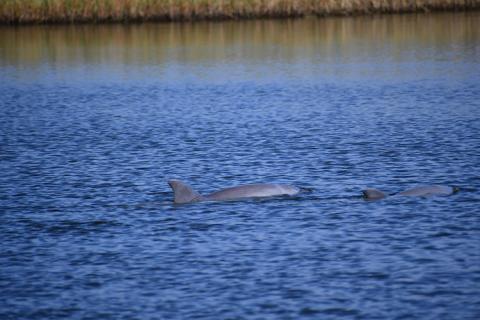Confined to a tidal pond system near Grand Isle, Louisiana for more than a year, a mother dolphin and her calf were successfully relocated to open water in mid-June by Louisiana Marine Mammal Stranding Network and partners.
The rescue is just one example of an enhanced capacity to respond to marine mammal strandings in Louisiana funded by the Louisiana Trustee Implementation Group through the settlement with BP after the 2010 Deepwater Horizon oil spill.
The rescue and relocation was led by the Louisiana Marine Mammal Stranding Coordinator, Lauren Noble, and Audubon Nature Institute’s Coastal Wildlife Network; the work was coordinated by NOAA Fisheries. National Marine Mammal Foundation, SeaWorld Orlando, Institute for Marine Mammal Studies, Dauphin Island Sea Lab, Mississippi State University, the South Carolina Aquarium, and the Grand Isle Police Department also participated in the effort.
Presumed to have been stranded due to storm surge and flooding after Hurricane Ida in September 2021, mother and baby had no way to return to open water. Fortunately, the animals had access to ample food and proper water salinities during their time in the pond system.
Monitored every month by the Coastal Wildlife Network, the pair were relocated after experts determined the younger dolphin was old enough to be safely moved. Such strandings of marine mammals and sea turtles are common after large storms and flooding events, requiring rescue by trained responders to return them to their natural habitat.
Louisiana Enhanced Marine Mammal Stranding Network
Additional support and coordination for the stranding network in Louisiana improves the ability to report and respond to such strandings, care for stranded animals to improve survival rates, and collect samples that provide valuable data to help improve conservation and restoration efforts for marine mammals. These samples can improve diagnoses of illness and death in marine mammals in Louisiana, which will increase our understanding of natural and human-based threats to these animals in Louisiana waters.
The public is advised to report all stranded or out-of-habitat marine mammals and sea turtles (live or dead) to the Louisiana Stranding Hotline at 877-942-5343.
When reporting strandings, the public should be prepared to give:
-
Exact location and/or GPS coordinates
-
Photographs of the animal
-
Nature of the report (type of animal/live or dead/size, etc.)
Recommendations when reporting a live stranded animal include:
-
Put human safety above animal safety. If conditions are dangerous, do not attempt to approach the animal
-
Don't push an animal on shore back into the water
-
Keep crowds away and noise levels down to avoid causing stress to the animal
-
If the animal returns to the water on its own, don't attempt to interact with it
-
Leave all entanglements (fishing line, ropes, etc.) that may be present on the animal
We also send updates out via email. If you haven't already, please take the opportunity to sign up for e-mail updates today to receive the latest news from all the Deepwater Horizon Trustees.


